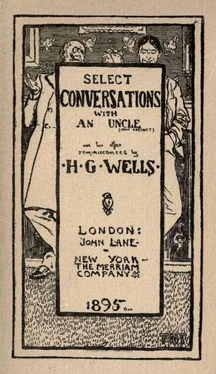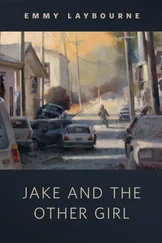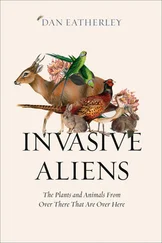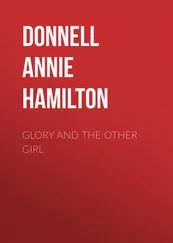Herbert Wells - Select Conversations with an Uncle (Now Extinct) / And Two Other Reminiscences
Здесь есть возможность читать онлайн «Herbert Wells - Select Conversations with an Uncle (Now Extinct) / And Two Other Reminiscences» весь текст электронной книги совершенно бесплатно (целиком полную версию без сокращений). В некоторых случаях можно слушать аудио, скачать через торрент в формате fb2 и присутствует краткое содержание. Жанр: Классическая проза, на английском языке. Описание произведения, (предисловие) а так же отзывы посетителей доступны на портале библиотеки ЛибКат.
- Название:Select Conversations with an Uncle (Now Extinct) / And Two Other Reminiscences
- Автор:
- Жанр:
- Год:неизвестен
- ISBN:нет данных
- Рейтинг книги:4 / 5. Голосов: 1
-
Избранное:Добавить в избранное
- Отзывы:
-
Ваша оценка:
- 80
- 1
- 2
- 3
- 4
- 5
Select Conversations with an Uncle (Now Extinct) / And Two Other Reminiscences: краткое содержание, описание и аннотация
Предлагаем к чтению аннотацию, описание, краткое содержание или предисловие (зависит от того, что написал сам автор книги «Select Conversations with an Uncle (Now Extinct) / And Two Other Reminiscences»). Если вы не нашли необходимую информацию о книге — напишите в комментариях, мы постараемся отыскать её.
Select Conversations with an Uncle (Now Extinct) / And Two Other Reminiscences — читать онлайн бесплатно полную книгу (весь текст) целиком
Ниже представлен текст книги, разбитый по страницам. Система сохранения места последней прочитанной страницы, позволяет с удобством читать онлайн бесплатно книгу «Select Conversations with an Uncle (Now Extinct) / And Two Other Reminiscences», без необходимости каждый раз заново искать на чём Вы остановились. Поставьте закладку, и сможете в любой момент перейти на страницу, на которой закончили чтение.
Интервал:
Закладка:
"I don't see it," said Bagshot, making head against the torrent. "I cannot afford to go to these swells and get original work of theirs——"
"What do you want with 'these swells' and their original work?" interrupted my uncle fiercely. "Haven't they used up all their originality ages ago? Is it not open to such men as yourself to discover new men? There are men pining in garrets now for you, Bagshot. Fancy the delight of having pictures that are unfamiliar, pictures that catch the eye and are actually to be looked at, pictures that suggest new remarks, pictures by a name that the stray visitor has never heard of and which therefore puzzle him dreadfully because he hasn't the faintest idea whether to praise or blame them! Isn't it worth hunting studios for, and even, maybe, going to the Academy? Besides, suppose your struggling artist comes to the front. What price the five-guinea specimen of his early style then? Your artistic virtue is indeed its own reward, and, besides, you can boast about finding him. The poor man of culture and the struggling artist live for one another, or at least they ought to—though I am afraid it is not much of a living for the struggling artist." He paused abruptly. "I suppose that autotype cost thirty shillings, and this carpet about five pounds?"
Bagshot assumed an elegant attitude against his bureau. He had discovered his reply. "You know you are bitten by the fashion for originality. Why should I make my room hideous with the work of third-rate mediocrity, or of men who are still learning to paint, simply in order to be unlike my neighbour?"
"Why," returned my uncle, "should you hang up things less interesting than your wall paper, in mere imitation of your neighbours? For this on your walls, Bagshot, deny it though you may, is not art but fashion. I tell you, you do not care a rap for art. You think pictures are a part of virtue, like a silk hat—or evening dress at dinner. And in your choice of pictures you follow after your kind. I never met a true-born Briton yet who dared to buy a picture on his own accord—unless he was a dealer. And then usually he was not really a true-born Briton. He waits to see what is being hung. He has these things now because he thinks they are right, not because they are beautiful, just as he used to have the Stag at Bay and the Boastful Hound. It is Leighton now; it was Landseer then. Really I believe that very soon the ladies' papers will devote a column to pictures. Something in this style. 'Smart people are taking down their Rossetti's Annunciations now, and are hanging Gambler Bolton's new Hippopotamus in the place of it. This Hippopotamus is to be the correct thing in pictures this year, and no woman with any claim to be considered smart will fail to have it over her piano. Marcus Stone's new engraving will also be rather chic. Watts's Hope is now considered a little dowdy.' And so forth. This gregarious admiration is the very antithesis of artistic appreciation, which I tell you, simply must be individual."
"Go on," said Bagshot, "go on."
"And that," said my uncle, with the glow of discovery in his face, "that is where the vulgar critic goes wrong. He conceives an orthodoxy. He tries to explain why Velasquez is better than Raphael and Raphael better than Gerard Dow. As well say why a cirrus cloud is better than a sycamore and a sycamore better than a scarlet hat. Every painter, unless he is a mere operative, must have his peculiar public. It is incredible that any painter can really satisfy the æsthetic needs of such a public as these reproductions indicate. True art is always sectarian. Why were Landseer and Sidney Cooper popular a few years ago, and why does every tea-table sneer at them now? There must be something admirable in them, or they would never have been admired. Then why has my niece Annie dropped admiring Poynter, and why does she pretend—and a very thin pretence it is—to admire Whistler?"
"You are wandering from my pictures," said Bagshot.
"I want to," said my uncle. "But why do you try and hide your taste under these mere formalities in frames? Why do you always say 'I pass' in the game of decoration? Better a mess of green amateurs and love therewith, than the richest autotypes and dull complacency. Have what you like. There is no such thing as absolute beauty. That is the Magna Charta of the world of art. What is beautiful to me is not beautiful to another man, in art as in women. But take care to get the art that fits you. Frankly, that 'Love and Death' suits you, Bagshot, about as much as a purple toga would. Orchardson is in your style. I tell you that the greengrocer who buys an original oil painting for sixteen shillings with frame complete is far nearer artistic salvation than the patron of the popular autotype. Surely you will wake up presently, Bagshot, and wonder what you have been about.
"Half-past four, by Jove! I must be getting on. Well, Bagshot, ta-ta. One must talk, you know. I really hope you will be comfortable in your new rooms."
And so good-bye to Bagshot, staring in a puzzled way at his reviled and desecrated walls.
ON SOCIAL MUSIC
My poor uncle came to me the other evening in a most distressful state, broken down to common blasphemy. His ample front was rumpled with sorrow and his tie disorderly aslant. His hair had gone rough with his troubles. "The time I have had, George!" he panted. "Give me something to drink in the name of Holy Charity."
Since the Pall Mall Gazette took to reporting his little sayings about photographs and ornaments, ideals and fashions, he has been setting up as a conversationalist. He thinks he was designed by Providence to that end, and aids his destiny as much as he can by elaborately preparing remarks.
Yet this thing had happened. "They put," said my uncle, "a little chap at the piano, and me at a very nice girl indeed as she looked; and the little chap began, and so did I. I said a prelude thing of mine, brand new and rather pretty."
He stopped. He turned to nerve himself with whisky.
"Well," I said, when the pause seemed sufficient; "what did she say?"
My uncle looked unspeakable things. Then in a whisper, bending towards me:
" She said——Sssh !"
He repeated it that I might grasp its full enormity, " Sssh !—so!"
"What is music," said my uncle, after a moody silence, "that reasonable people should listen to it? I had to listen to it myself, and it struck me. It was just a tune this little chap was trying to remember, and now he would come at it this way and now that. He never got it quite right, though he fumbled about it for ten minutes or a quarter of an hour. And then two girls went, and one punished the piano while the other, with a wrist rather than an ear for music, drowned its cries with a violin. So it went on all the evening, and when I moved they all looked at me; I had been put on a nervous wicker chair, and I knew my shoes squeaked like a carnival of swine, and so I could not get away. And all the things that kept coming into my head, George, the neat remarks and graceful sayings!
"You see, I look at it in this light. Music is merely background, and ought to be kept in its place. I am no enemy of music, George. The air in a room should be melodious, for the same reason that it should be faintly pleasing to the olfactory sense, and neither hot nor stuffy. Just as the walls should be delightfully coloured and softly lit, and the refreshments pleasant and at the moment of need. But surely we meet for human intercourse. When I go to see people I go to see the people—not to hear a hired boy play the piano. But these people plant a chevaux de frise of singers and performers upon instruments of music between themselves and me. They gag me with a few pennyworths of second-hand opera. There I was bursting to talk, and nice, intelligent-looking girls to talk to, and whenever I began to say something they said ' Sssh !' Tantalus in a drawing-room it was—the very Hades of hospitality.
Читать дальшеИнтервал:
Закладка:
Похожие книги на «Select Conversations with an Uncle (Now Extinct) / And Two Other Reminiscences»
Представляем Вашему вниманию похожие книги на «Select Conversations with an Uncle (Now Extinct) / And Two Other Reminiscences» списком для выбора. Мы отобрали схожую по названию и смыслу литературу в надежде предоставить читателям больше вариантов отыскать новые, интересные, ещё непрочитанные произведения.
Обсуждение, отзывы о книге «Select Conversations with an Uncle (Now Extinct) / And Two Other Reminiscences» и просто собственные мнения читателей. Оставьте ваши комментарии, напишите, что Вы думаете о произведении, его смысле или главных героях. Укажите что конкретно понравилось, а что нет, и почему Вы так считаете.










